General News
US President-elect breaks stance with direct Taiwan call
US President-elect Donald Trump had spoken directly with the president of Taiwan, therefore, breaking the US policy set when the formal relationship between the two nations was cut in 1979. The US still maintained friendly non-official relations with Taiwan.
According to Mr. Trump's transition team, President-elect Trump and Tsai Ing-wen noted "close economic, political, and security ties" between the US and Taiwan in the said phone call. A spokesman for the White House National Security Council said Mr. Trump's conversation did not signal any change to long-standing US policy, which is a commitment to the,“One China' policy.” The call risks angering China, which sees Taiwan as a breakaway province.
China has hundreds of missiles pointing towards the island and has threatened to take it by force if necessary. However, Beijing is yet to make public comment on the latest development.
US President-elect Trump "congratulated" Ms. Tsai on becoming the first female president of Taiwan in January's elections after the leading the Democratic Progressive Party (DPP) to a landslide victory in the poll. The DPP has traditionally leaned towards independence from China.

Ms. Tsai's presidency is expected to see a change in the relationship between Taipei and Beijing
- Read more
-
02/Dec/2016
Ohio State University attacker was 'Somali refugee'
Abdul Razak Ali Artan who injured 11 people, one critically, in a rampage at Ohio State University, was of Somali descent and a student on campus according to US officials.
Abdul Razak Ali Artan,18 years of age, rammed his car into a group of pedestrians at the college before he began stabbing people. Police shot him dead and has started investigating whether the incident was a terrorist attack. CCTV cameras filmed the suspect, Artan, arriving on campus alone which is an indication he did not have an accomplice helping him during the attack. The FBI has joined the inquiry at the 60,000-student campus in Columbus, Ohio. Artan who studied logistics management in the college of Business at Ohio State was a Somali refugee living in the United States as a legal permanent resident.
The incident began at 10:00 local time on Monday when Artan drove his vehicle over the curb on campus, striking pedestrians near Watts Hall, which happens to be the science and engineering building.
As if that wasn't enough Artan got out of the vehicle and began stabbing bystanders with a "butcher's knife" according to Ohio State Police Chief Craig Stone. A policeman, 28-year-old Alan Horujkowho, nearby shot the attacker dead in less than a minute. Those directly affected by the attack included a mix of academic faculty, maintenance staff, and graduate and undergraduate students of the University.
- Read more
-
28/Nov/2016
Assange faces Sweden "rape" questions in Ecuadorean embassy
Sweden's chief prosecutor is questioning WikiLeaks founder Julian Assange about a rape allegation at the Ecuadorean embassy in London. He denies the allegation that he raped a Swedish woman in 2010.
Swedish prosecutor Ingrid Isgren is listening as an Ecuadorean prosecutor puts the questions to Mr Assange.
He took refuge in the embassy four years ago, fearing extradition. He says the sex was consensual and believes the allegations are politically motivated.
The accusations relate to a visit Mr Assange made to Stockholm in August 2010 to give a lecture.
He has refused to travel to Sweden for questioning citing concerns he would be extradited to the US over WikiLeaks' release of 500,000 secret military files on the Afghanistan and Iraq wars. However, lawyers argue that his extradition from Sweden would be even less likely than from the UK.
Mr Assange is accused of raping a woman, named in legal papers as SW, at her home in August 2010.
Swedish prosecutors dropped part of their investigation last year because of a statute of limitations.
Mr Assange is "not hiding" at the embassy, but he will not go to Sweden because he would thereby risk losing his Ecuadorean asylum status, his lawyer Jennifer Robinson told the BBC on Monday.
"Sweden refused to provide assurances against onward extradition to the United States," she said, accusing the Swedish authorities of "dragging their feet" over the case.
It's taken many months of tortuous diplomatic and legal exchanges just to get the Swedish prosecutor in the door.
Under the agreement worked out with Ecuador, the Swedes were not allowed to question Julian Assange directly. Instead questions were to be submitted in Spanish and put to the WikiLeaks founder by an Ecuadorean prosecutor.
No follow-up questions were allowed.
This may explain why the Swedish prosecutor had been reluctant to question Julian Assange in London, insisting it would "lower the quality of the interview". She changed her mind in March 2015, a few months before lesser allegations made against Julian Assange had to be dropped because of a time limitation.
At the embassy Mr Assange is beyond the reach of the UK authorities. Sweden has issued an arrest warrant for him, which he has appealed against.
Shortly after Ms Isgren entered the embassy, a cat - said to belong to Mr Assange - appeared at one of the windows and began watching the journalists and Assange supporters gathered outside.
The cat has its own Twitter feed, which says it lives with Mr Assange and is "interested in counter-purrveillance".

Mr Assange's cat - sporting a tie - kept watch on the crowd outside
Confidentiality
A statement on behalf of the Swedish prosecutors, quoted by the Press Association, said the investigation would remain confidential, including the interview at the embassy.
"Therefore, the prosecutors cannot provide information concerning details of the investigation after the interview," it said.
One of Mr Assange's lawyers, Per Samuelson, said his client "is very happy that he finally will be given the opportunity to give his statement to the Swedish prosecution.
"He has been waiting for this for over six years. He has prepared himself very carefully and will give a statement and will co-operate to the full extent."
Source: graphic.com.gh
- Read more
-
14/Nov/2016
South Africa: Jacob Zuma report points to possible corruption
An investigation into South Africa's President Jacob Zuma has found evidence of possible corruption at the top level of his government.
In the report, former Public Protector Thuli Madonsela recommends Mr Zuma establish a judicial commission of inquiry within 30 days.
Mr Zuma is accused of an improper relationship with wealthy businessmen.
He had tried to block the release of the report, but dropped his court bid on Wednesday.
The president and leader of the governing African National Congress (ANC) has been dogged by corruption allegations for more than a decade, but has repeatedly denied any wrongdoing.
Police fired water cannon to disperse protesters who marched on Mr Zuma's main office in Pretoria to demand his resignation.
The 355-page report by former anti-corruption chief Thuli Madonsela is entitled "State of Capture" and is illustrated on its front page with a hand strung with puppet wires.
- Africa Live: Updates from anti-Zuma march
- The Guptas and their links to Zuma
- South Africa's corruption crusader
Deputy Finance Minister Mcebisi Jonas is quoted in the report as saying that businessman Ajay Gupta offered him 600m rand ($44.6m; £36.2m) last year, "to be deposited in an account of his choice", if he accepted the post of finance minister.
Mr Gupta also asked him if he had "a bag which he could use to receive and carry 600,000 rand in cash immediately", Mr Jonas alleged, adding that Mr Zuma's son, Duduzane, was present at the meeting.
He was expected to remove key Treasury officials from their posts and advance the Gupta family's "business ambitions", Mr Jonas is quoted as saying.
The businessman has not yet commented on the report, but has previously denied any wrongdoing.
The Gupta family is close to President Zuma, and the two have been nicknamed by the opposition as the "Zuptas".
After Mr Jonas rejected the alleged offer, little-known ANC MP Des van Rooyen was appointed finance minister.
Ms Madonsela said she had obtained evidence, including telephone records, placing Mr Van Rooyen at the Gupta's family home on seven occasions, including the day before the appointment.
Mr Zuma was forced to sack him four days later after South Africa's currency went into a tailspin.
The report also contains allegations that:
- Ajay Gupta boasted that as a family they had "made a lot of money from the state", putting the figure at 6bn rand, according to Mr Jonas
- Mr Zuma told former government media chief Themba Maseko that the "Gupta brothers need your help, please help them"
- Mr Gupta asked Mr Maseko to channel advertising to a newspaper the family was setting up
- The board of power utility Eskom appeared to have been improperly constituted
- It made payment of nearly one billion rand to a firm linked to the Guptas and the president's son
- The payments may amount to "wasteful expenditure"
- Eskom boss Brian Molefe and Mr Gupta made 58 telephone calls to one another between August 2015 and March 2016.
Opposition Democratic Alliance (DA) leader Musi Maimane said state coffers were being "plundered" by "crooks", but the "good guys" were winning in the battle to safeguard the democracy which emerged in South Africa at the end of minority rule in 1994.
There has not been any immediate reaction from Mr Zuma, who did not co-operate with the investigation, saying he had not been given enough time.
Will Zuma live to fight another day? Milton Nkosi, BBC News, Pretoria
This report is bad for President Zuma but certainly not as damning as opposition parties and many others had hoped when they went to court.
The findings and subsequent remedial action seem to kick the can down the road. It says that the president should appoint a judicial commission of inquiry. This means that Mr Zuma would still occupy the highest office in the land for many months to come, as he slowly approaches the end of his second and last term.
There is no doubt that should the inquiry recommend that Mr Zuma be censured, there would be grounds for impeachment.
But that would present a political problem in the house of assembly because Mr Zuma's own party, the ANC, holds an overwhelming majority.
The loyal MPs have overcome many attempts by the opposition to have a vote of no confidence in the president.
Mr Zuma lives to fight another day but he must surely be nearing the last of his nine lives.
An earlier statement from the president's office said the decision to abandon a court bid to block the report's release was made "in the interest of justice and speedy resolution of the matter".
"The president will give consideration to the contents of the report in order to ascertain whether it should be a subject of a court challenge," it said.
Mr Zuma survived an impeachment vote earlier this year after South Africa's highest court upheld another finding of Ms Madonsela - that he had "unduly benefited" from government money used to upgrade his private home in the rural area of Nkandla in KwaZulu-Natal province.
Ms Madonsela stepped down as Public Protector at the end of her seven-year term last month.
The Guptas in South Africa:
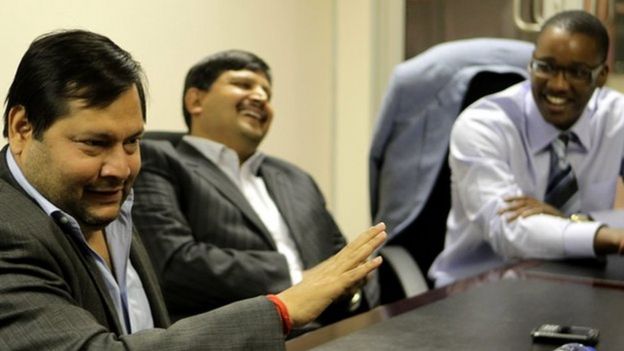
Jacob Zuma's son Duduzane (right) was a business partner of the Guptas until recently
- Ajay, Atul and Rajesh Gupta moved to South Africa from India in 1993
- Set up businesses in air travel, mining, energy, technology and media
- Opposition nicknamed them and the president as "Zuptas" because of their close relationship
- Deny influencing ministerial appointments to advance their business interests
- Accused of being involved in "suspicious" transactions worth about $490m (£400m)
- Say they are withdrawing from their South African businesses because of political backlash
- Big banks have refused to do business with them
Source: bbc.com
- Read more
-
02/Nov/2016
Italy quake: Norcia tremor destroys ancient buildings
Towns and villages in central Italy have been hit by an earthquake for the fourth time in three months.
The 6.6-magnitude quake - Italy's strongest in decades - struck close to the region where nearly 300 people were killed by a quake in August.
This time no-one appears to have died, but about 20 people were injured.
The medieval basilica of St Benedict in Norcia, the town closest to the epicentre, was among buildings destroyed.
An evacuation of buildings in the region deemed vulnerable to seismic activity last week, following strong aftershocks from August's quake, may have saved lives.
Tremors from this latest earthquake were felt in the capital Rome, where the Metro system was shut down, and as far away as Venice in the north.
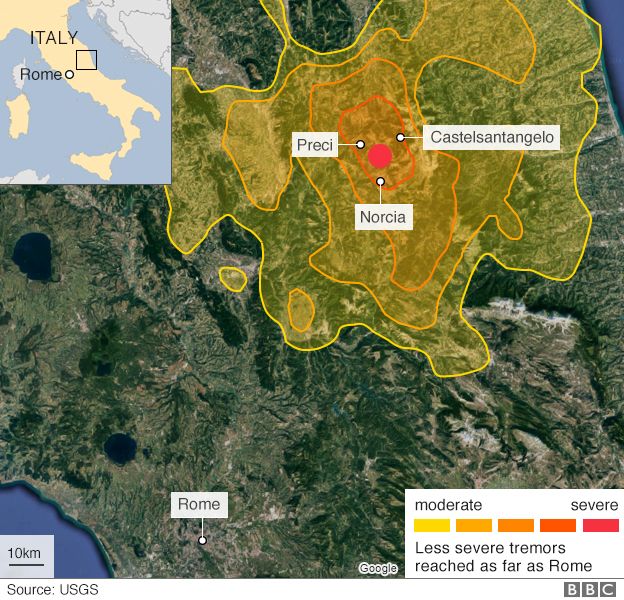
The head of the national civil protection agency, Fabrizio Curcio, said there had been extensive damage to many historic buildings but no deaths had been registered.
"About 20 people are injured. As far as people are concerned, the situation is positive, but many buildings are in a critical state in historic centres and there are problems with electricity and water supplies," he added.
Prime Minister Matteo Renzi has promised that everything will be rebuilt, saying resources will be found.
"We are going through a really tough period," he said. "We must not allow the profound pain, fatigue and stress that we have now to turn into resignation."
Pope Francis mentioned the quake in his Sunday blessing in Rome's St Peter's Square.
"I'm praying for the injured and the families who have suffered the most damage, as well as for rescue and first-aid workers," he said to loud applause.
Why multiple quakes are hitting Italy - by Jonathan Amos, BBC science correspondent
We have now seen three magnitude-6 tremors in Italy's Apennines region in just three months.
The big picture is reasonably well understood. Wider tectonic forces in the Earth's crust have led to the Apennines being pulled apart at a rate of roughly 3mm per year - about a 10th of the speed at which your fingernails grow.
But this stress is then spread across a multitude of different faults that cut through the mountains. And this network is fiendishly complicated.
It does now look as though August's event broke two neighbouring faults, starting on one known as the Laga and then jumping across to one called the Vettore.
The mid-week tremors appear to have further broken the northern end of the Vettore. But both in August and mid-week, it seems only the top portions of the faults have gone, and the big question is whether the deeper segments have now failed in the latest event.
The US Geological Survey said the epicentre of the quake was 68km south-east of the regional centre of Perugia and close to the small town of Norcia, which is believed to be the birthplace of St Benedict.
Images from the town show the almost complete destruction of the medieval basilica erected in St Benedict's name, with just its facade left standing.
"It was like a bomb went off," said the town's deputy mayor, Pierluigi Altavilla.
"We are starting to despair. There are too many quakes now, we can't bear it anymore."
The earthquakes have left the residents of Norcia anxious and shattered. Stefano and his family have slept in a camper van since the first quake in August - they decided it was too dangerous to sleep indoors. He's now looking to get his family out of here.
In the hour after I arrived, there were two sizeable aftershocks - which sent bits of masonry from the town's ancient walls to the ground. The aftershocks added to the tension felt by residents here.
An emergency HQ has been set up in a car park. Civil protection officials are assessing the damage.
Next to a petrol station, there is a group of people with their bags packed, ready to leave. They don't want to wait for another quake to hit.
Giuseppe Pezzanesi, mayor of Tolentino in the neighbouring Marche region, said the small town had "suffered our blackest day yet".
"The damage is irreparable. There are thousands of people in the streets, terrified, crying. Let's hope that is an end to it, the people are on their knees psychologically."
The towns of Castelsantangelo and Preci have also suffered considerable damage, but were mainly abandoned after last week's quakes, of magnitude 5.5 and 6.1.
Castelsantangelo's mayor, quoted by La Stampa newspaper, said there were no casualties at all in the town as "everyone had already left".
The mayors of the villages of Ussita and Arquata said many buildings had collapsed there too.
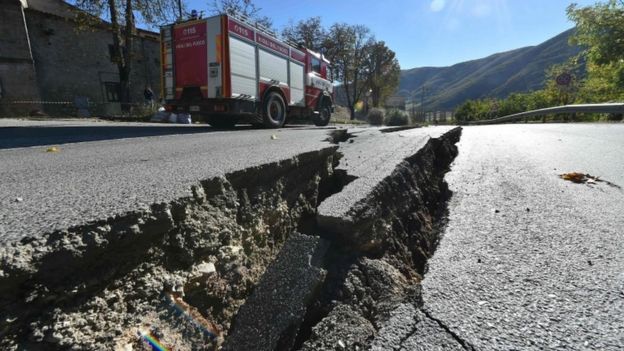
Central Italy has seen several major quakes in recent years. Earthquakes which devastated the town of L'Aquila in 2009 and Amatrice in August this year killed about 300 people each.
But they both measured only 6.2 and were deeper than Sunday's earthquake.
Source: bbc.com
- Read more
-
30/Oct/2016
Women 'nearing equality with men - in alcohol consumption'
Women have all but caught up with men at knocking back alcohol, a global study of drinking habits shows.
The analysis of 4 million people, born between 1891 and 2001, showed that men used to be far more likely to drink and have resulting health problems.
But the current generation have pretty much closed the gap, the BMJ Open report says.
The changing roles of men and women in society partly explain the move towards boozing parity.
The study showed that in people born in the early 1900s, men were:
- More than twice as likely as women to drink alcohol at all (2.2 times)
- Three times as likely to drink to problematic levels
- And 3.6 times as likely to develop health problems from drinking, such as liver cirrhosis
But over the ensuing decades, the gap closed so that for those born at the end of the century men were only:
- A smidge - 1.1 times - as likely as women to drink alcohol at all
- A much lower 1.2 times as likely to drink to problematic levels
- And 1.3 times as likely to develop health problems from drinking
The team at the University of New South Wales, in Australia, analysed data from people all over the world - although it was massively skewed towards North America and Europe.
They concluded: "Alcohol use and alcohol-use disorders have historically been viewed as a male phenomenon.
"The present study calls this assumption into question and suggests that young women, in particular, should be the target of concerted efforts to reduce the impact of substance use and related harms."
Prof Mark Petticrew, from the London School of Hygiene and Tropical Medicine, said: "Men's and women's roles have been changing over the decades, this is likely to account for some of these trends - but not all.
"The increasing availability of alcohol also plays an important part, as does the way that alcohol marketing is often targeted specifically at women and particularly young women.
"Health professionals need to help the public - both men and women - to understand the health risks of alcohol consumption, and how to reduce those risks."
- Read more
-
24/Oct/2016
Quetta attack: Militants kill dozens at Balochistan Police College
At least 58 cadets and guards have been killed after militants attacked a police college in the Pakistani city of Quetta, officials say.
Three militants wearing suicide bomb vests entered the college late on Monday, reportedly taking hostages.
A major security operation lasted for hours and all attackers were killed.
No group has said they carried out the assault, but Quetta has seen similar attacks by separatists and Islamist militants in recent years.
Hundreds of trainees were evacuated from Balochistan Police College as troops arrived to repel the militants. Local media reported at least three explosions at the scene.
"I saw three men in camouflage whose faces were hidden carrying Kalashnikovs," one cadet said according to AFP news agency. "They started firing and entered the dormitory but I managed to escape over a wall."
The police academy is home to about 600 students and many of the cadets who died were killed in the blasts, said Major General Sher Afgan of the Frontier Corps.
The exact sequence of events is unclear but there was intermittent exchange of fire between the attackers and security forces for several hours, according to Dawn newspaper. There were also reports of a hostage situation.
More than 100 people, mostly trainees, were injured.
Pakistan's army and the paramilitary Frontier Corps took part in the military counter-operation, which Balochistan provincial home minister Mir Sarfaraz Ahmed Bugti said was now over.
Two of the militants died after detonating their bomb vests and one was killed by security forces.
Officials blamed a faction of the Lashker-e-Jhangvi militant group and said the attackers "were in communication with operatives in Afghanistan".
Quetta is the capital of Balochistan province, which is battling an insurgency as well as Islamist militants, with violent attacks common.
Earlier in the day, two customs officers were shot dead and another critically wounded in Surab, south of Quetta.
In August, 88 people were killed in separate bomb attacks targeting a hospital and lawyers in Quetta.
The Pakistani military has been conducting military operations against militants in volatile tribal areas near the Afghan border.
Source: bbc.com
- Read more
-
24/Oct/2016
Thirteen die in California tour bus crash
Thirteen people have been killed and more than 30 injured in southern California after a tour bus ran into the back of a lorry, media reports say.
Most of the passengers are reported to be from Latin America.
The crash happened on Interstate 10 close to the resort town of Palm Springs in the early hours of Sunday morning.
Investigators are examining the cause of the crash, which happened as the bus was bound for Los Angeles.
Rescuers used ladders to climb into the bus windows to remove bodies. Five of the injured passengers are in critical condition.
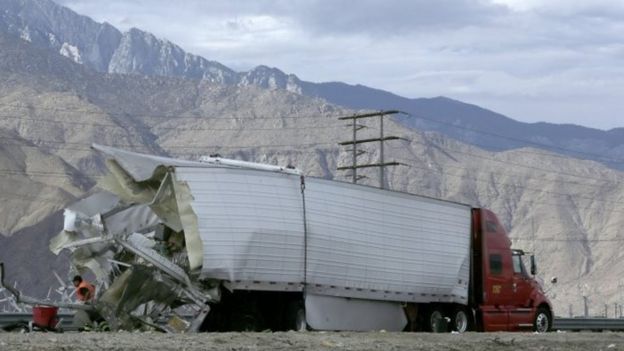
The lorry involved in the accident was also extensively damaged
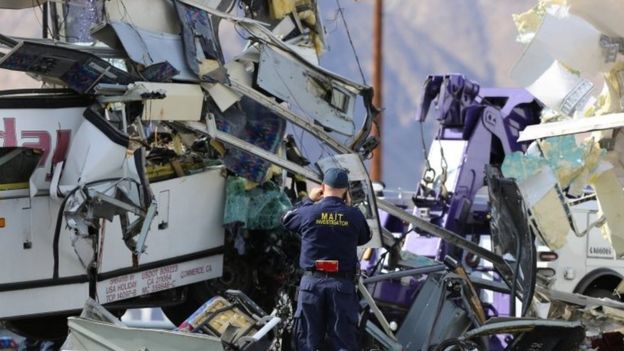
The front of the bus was severely mangled
The Los Angeles Times described the crash as the deadliest in California for several decades. It said that the bus careered into the rear of the truck at high speed, mangling the front third of the bus.
Most of those who died were apparently at the front of the bus, the newspaper reported. The driver was among the fatalities.
Officials quoted by the paper said that identifying the victims could take days, because some were not carrying identity cards or had lost their belongings when they were taken to hospital.
They have warned that it may not be possible to determine exactly why the accident happened because of the driver's death.
Investigators will assess whether he might have fallen asleep or had a heart attack, in addition to determining if there was a mechanical failure or some other kind of emergency.
The westbound lanes of the interstate were closed near the crash site but are now reported to have been reopened.
According to the Desert Sun newspaper, the tour bus, run by US Holiday, was coming from Red Earth Casino, near Salton City in California.
The small Los Angeles-based company, runs trips to casinos in California and Las Vegas. The driver of the bus was one of the owners of the tour company.
The Federal Motor Carrier Safety Administration records show the company had one vehicle and one driver. According to the data the company held a satisfactory safety rating and had not been in a crash for two years.
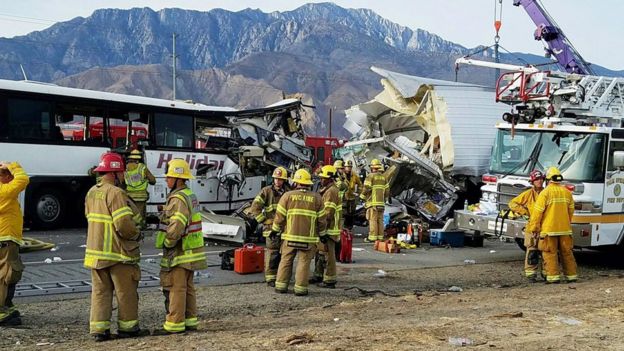
The cause of the crash is still unknown
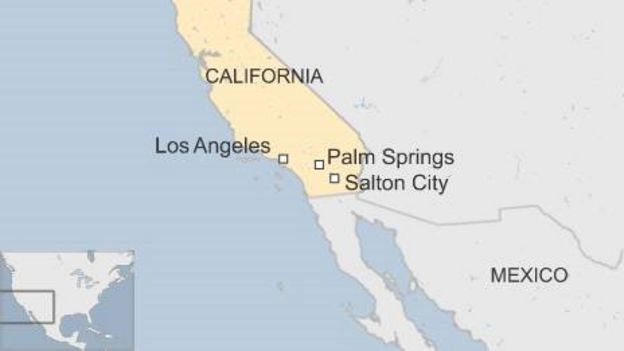
Source: bbc.com
- Read more
-
23/Oct/2016
'Smart' home devices used as weapons in website attack
Hackers used internet-connected home devices, such as CCTV cameras and printers, to attack popular websites on Friday, security analysts say.
Twitter, Spotify, and Reddit were among the sites taken offline on Friday.
Each uses a company called Dyn, which was the target of the attack, to direct users to its website.
Security analysts now believe the attack used the "internet of things" - web-connected home devices - to launch the assault.
Dyn is a DNS service - an internet "phone book" which directs users to the internet address where the website is stored. Such services are a crucial part of web infrastructure.
On Friday, it came under attack - a distributed denial of service (DDoS) - which relies on thousands of machines sending co-ordinated messages to overwhelm the service.
The "global event" involved "tens of millions" of internet addresses.
Security firm Flashpoint said it had confirmed that the attack used "botnets" infected with the "Mirai" malware.
Many of the devices involved come from Chinese manufacturers, with easy-to-guess usernames and passwords that cannot be changed by the user - a vulnerability which the malware exploits.
"Mirai scours the Web for IoT (Internet of Things) devices protected by little more than factory-default usernames and passwords," explained cybersecurity expert Brian Krebs, "and then enlists the devices in attacks that hurl junk traffic at an online target until it can no longer accommodate legitimate visitors or users."
The owner of the device would generally have no way of knowing that it had been compromised to use in an attack, he wrote.
Mr Krebs is intimately familiar with this type of incident, after his website was targeted by a similar assault in September, in one of the biggest web attacks ever seen.
Media affected by attack - Leo Kelion, technology desk editor
It has emerged that the BBC's website was also briefly caught up in Friday's attack. The BBC is not a customer of Dyn itself, but it does use third-party services that rely on the domain name system hosting facilities provided by Dyn.
I understand that these include Amazon Web Services - the retail giant's cloud computing division - and Fastly - a San Francisco-based firm that helps optimise page download times.
Both companies have acknowledged being disrupted by the DDoS assault. Only some BBC users, in certain locations, would have experienced problems and they did not last long.
But there are reports that other leading media providers also experienced similar disruption.
It serves as a reminder that despite the internet being a hugely robust communications system, there are still some pinch points that mean a targeted attack can cause widespread damage.
The incidents mark a change in tactics for online attackers.
DDoS attacks are typically aimed at a single website. Friday's attack on Dyn, which acts as a directory service for huge numbers of firms, affected several of the world's most popular websites at once.
The use of internet-connected home devices to send the attacking messages is also a relatively new phenomenon, but may become more common.
The Mirai software used in these attacks was released publicly in September - which means anyone with the skill could build their own attacking botnet.
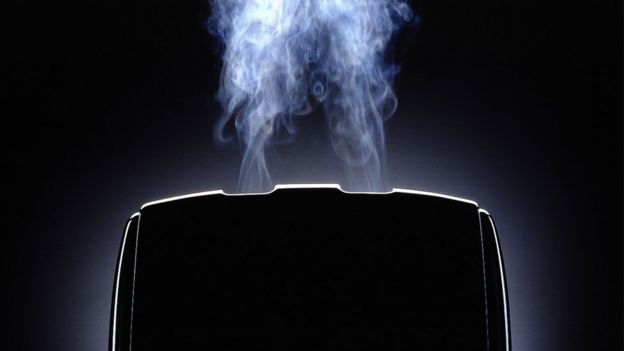
Any number of home devices could be used in such attacks - so long as they're connected to the internet
On social media, many researchers and analysts expressed frustration with the security gap being exploited by attackers.
"Today we answered the question 'what would happen if we connected a vast number of cheap, crummy embedded devices to broadband networks?'" wrote Matthew Green, an assistant professor at the Johns Hopkins Information Security Institute.
Jeff Jarmoc, head of security for global business service Salesforce, pointed out that internet infrastructure is supposed to be more robust.
"In a relatively short time we've taken a system built to resist destruction by nuclear weapons and made it vulnerable to toasters," he tweeted.
Source: bbc.com
- Read more
-
22/Oct/2016
Mosul battle: Hundreds treated over toxic fumes in Iraq
Hundreds of people in Iraq are being treated for the effects of toxic gases after a sulphur plant was set alight in fighting with so-called Islamic State.
The US military says IS fighters set the plant on fire earlier this week, as they fled an advance by pro-government forces on their Mosul stronghold.
On Saturday, US soldiers at a base near Mosul donned protective masks as wind blew smoke towards them.
Reuters said another 1,000 people were being treated for breathing problems.
An Iraqi commander, Qusay Hamid Kadhem, told AFP news agency two civilians had died from the fumes and "many others" had been injured.
Meanwhile, advancing Iraqi forces entered the town of Qaraqosh, 32km (20 miles) south of Mosul, the IS capital.
Qaraqosh, Iraq's largest Christian town before the war, is said to be largely empty but IS has laid landmines on the approaches to Mosul.
The militants have been attacking with suicide bombers elsewhere, driving vehicles laden with explosives at high speed towards government lines.
Friday's IS attack on the city of Kirkuk, 170km (105 miles) south-east of Mosul, now appears to be over, leaving at least 35 people dead and 120 wounded, according to medical sources.
Voices from Mosul as battle nears
Dodging ghosts of IS in the desert
The latest on the toxic smoke
Qayyarah, where the plant was set alight, acts as the main US hub for supporting the Iraqi government offensive to drive IS out of their Mosul stronghold.
The fire began two days ago, when IS fighters reportedly set the sulphur plant alight in Mishraq, south of Mosul.
"The winds have actually shifted south, so, as a precautionary measure, the troops at Qayyara West have donned their personal protective equipment - continuing their operations at this point in time," an official told Reuters news agency, speaking on condition of anonymity.
A similar fire at the Mishraq plant in 2003 burnt for weeks, sending huge amounts of sulphur dioxide into the air. It caused respiratory problems for local people and damaged the environment.
How harmful can sulphur dioxide be?
Sulphur dioxide gas is toxic when inhaled or when the skin or eyes are exposed.
When inhaled, it causes irritation to the nose and throat. Exposure to high concentrations causes nausea, vomiting, stomach pain and corrosive damage to the airways and lungs.
Skin contact causes stinging pain, redness of the skin and blisters, while eye contact causes watering and, in severe cases, may cause blindness.
Turkey's role under scrutiny
US Defence Secretary Ash Carter made an unscheduled visit to Baghdad on Saturday after talks with Turkish leaders in Ankara on Friday on how they might play a part in the Mosul operation.
Iraqi Prime Minister Haider al-Abadi told Mr Carter: "I know that the Turks want to participate, we tell them thank you, this is something the Iraqis will handle. If help is needed, we will ask for it from Turkey or from other regional countries."
Differences between Iraq and Turkey have come to the fore since hundreds of Turkish soldiers began training Sunni Muslim fighters at a base in northern Iraq last year.
The Sunni Turks fear the liberation of Mosul may be spearheaded by Shia Muslims and Kurds. Turkey says Kurdish fighters in Syria and Iraq have ties to the Kurdish militant PKK in Turkey.
The presence of the Turkish military has also drawn protests among radical Shia in Baghdad.
Mr Carter, who is in Iraq for the third time this year, has overseen a steady increase in US troop numbers there.
More than 4,800 US soldiers are in Iraq and at least 100 US special operations personnel are operating with Iraqi units.
The offensive against Mosul, which began on Monday, is a two-pronged operation, with Iraqi government forces attacking from the south and Kurdish fighters advancing from the east.
Reports on Tuesday that Qaraqosh had been liberated caused an outpouring of joy among Christians who had fled to Kurdish areas when IS swept into Mosul in June 2014.
But the reports turned out to be premature as snipers impeded the progress of government forces.
In Kirkuk, the governor, Najmiddin Karim, said "all" of the IS attackers had been killed by the security forces.
However, Kurdish forces controlling the city detained a number of suspected IS members on Saturday, according to an AFP photographer who recorded the arrests.
Photos of damaged buildings in the city show the full ferocity of Friday's combat, with facades peppered by gunfire.
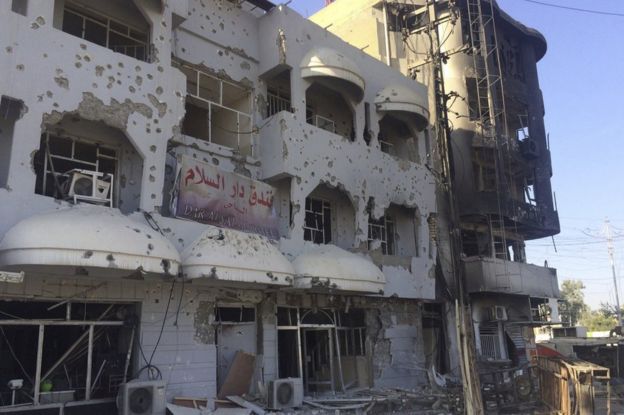
Concern for the fate of civilians in Mosul increased on Friday after reports that IS was herding villagers into the city, possibly to use them as human shields.
The UN is also investigating reports 40 people were shot dead by IS fighters in one village.
Source: bbc.com
- Read more
-
22/Oct/2016
Is Angela Merkel really on the ropes?
At the end of July, Germany was hit by a series of violent attacks, three of which were carried out by asylum seekers. So are Germans turning against Chancellor Angela Merkel's refugee policy? Damien McGuinness in Berlin is not convinced.
"Merkel on the ropes!" screeched one headline, after the recent attacks in Germany, before going on to predict confidently that her "premiership is hanging by a thread".
"Calls for Chancellor Angela Merkel to stand down grow," wrote another paper.
But what's interesting about these and similar articles is that they were written by English-speaking journalists reporting from outside Germany.
No leading politician suggests that Germany should stop accepting refugees fleeing war
And in both these cases, the only evidence that Merkel's government was apparently about to fall was a video filmed by Russian TV of right-wing extremists protesting in Berlin. No polling data. No evidence. Just that video.
You can't necessarily blame the journalists. From the outside the narrative makes sense. Merkel allows Germany to take in more than a million asylum seekers from the Middle East. A year later there are violent Islamist attacks committed by migrants. So it stands to reason that her government is on the verge of collapse.
The problem is, though, the facts really get in the way of that story. Almost 70% of Germans do not think that Merkel's refugee policy contributed to the attacks, and the violence has barely had any effect on support for her centre-right party, making it unlikely that anyone else will lead the next government, let alone topple the present one.
Since the attacks, her personal approval ratings have slipped, but almost half of German voters, across the political spectrum, say they still want her as chancellor. In fact, she has no credible rivals - the left-wing opposition is small and the anti-migrant Alternative for Germany party is riven with internal rivalries.
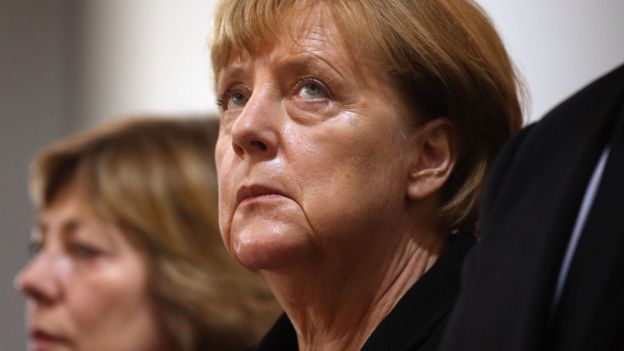
Angela Merkel at a memorial service for the victims of the Munich shooting spree
In times of turmoil, history shows that the unflappable Angela Merkel actually does quite well. With every crisis she's written off by many commentators. But weirdly, like some indestructible rubber cartoon character, she bounces back. From Brexit to eurozone chaos, she's seen as a safe pair of hands.
Even, to a large extent, after these latest attacks. At first there was some criticism that she was too slow to respond. Immediately after the Munich shooting, in which 10 people died, French President Francois Hollande condemned what he called a brutal act of Islamist terror. Some here said: "Why does the French leader speak, and not ours?"
Until, it turned out, that it wasn't an act of Islamist terror at all - but rather a US-style shooting spree, carried out by a disturbed German-born teenager obsessed with right-wing extremism and mass shootings.
And that's the point: despite what the most lurid headlines indicate, unlike France, Germany hasn't yet been hit by a major Islamist terror attack. In the two recent attacks by asylum seekers, which were claimed by so-called Islamic State, no victim was killed.
That's not to ignore the fierce debate around Berlin's refugee policy - Germany is split. People are nervous about more attacks and increasingly uneasy about migration. And with parliamentary elections next year, Merkel faces pressure from all her rivals - from the left and from the right.
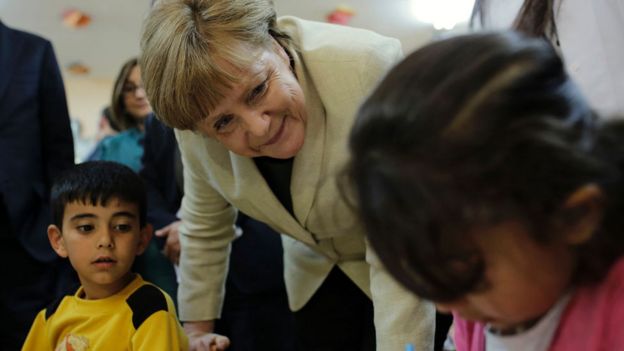
Angela Merkel meets children at a refugee camp on the Turkish-Syrian border in April
There are calls to screen migrants better. Many now say failed asylum seekers should be sent back, whether they've come from a war zone or not. And dip into German social media, and the criticism of Merkel becomes vicious.
But no leading politician suggests that Germany should stop accepting refugees fleeing war, and some of the pressure on Merkel comes from left-wing critics, who say she's not doing enough to help migrants.
The debate in the mainstream media, meanwhile, is the very opposite of alarmist. The tabloid, Bild, Germany's best-selling newspaper, has positioned itself as the crusading champion of refugee rights, while traditionally tough-talking ministers have warned against stigmatising migrants since the attacks.
More violence, or a major IS terror attack, could endanger this measured approach. And some do question whether too cosy a consensus in the mainstream marginalises legitimate concerns that should be debated.
But the attitude of German political leaders also hints at a deeper question - namely, what is the responsibility of government? Should it lead or follow popular opinion?
Angela Merkel's idea of government is top-down, trust-us-we-know-best, which in this age of referendums and social media is not exactly fashionable. But she's not following, she's leading. Not everyone agrees with her, and her approach is not risk-free. Merkel, though, is not changing her mind. And, for now at least, she's staying exactly where she is.
Source: bbc.com
- Read more
-
07/Aug/2016
Belgium machete attacker was Algerian, say officials
Belgian officials say a man who wounded two policewomen with a machete was a 33-year-old Algerian with a criminal record but no known terror links.
An inquiry for "attempted terrorist murder" has been launched into Saturday's attack in Charleroi.
The man reportedly shouted "Allahu Akbar" ("God is greatest") during the assault outside a police station. He died after being shot by officers.
On Sunday the so-called Islamic State group called him one of its "soldiers".
The statement was similar to those released after recent attacks in France and Germany.
Following standard practice, prosecutors did not name the attacker but gave his initials as KB.
He had been living in Belgium since 2012 and had minor offences to his name.
Belgium has been on alert since bomb attacks on the city's airport and subway system in March killed 32 people.
Charleroi was used as a base by some of the jihadists involved in that attack, and in the attack on Paris in November 2015.
Prime Minister Charles Michel, who broke off his holiday after the attack, has urged people to remain "constantly vigilant" but "keep a cool head".
Saturday's attack unfolded at just before 16:00 local time (14:00 GMT).
A police spokesman said the attacker pulled the machete out of a sports bag as he approached a guard post outside the police HQ.
According to a local news agency, one of the policewomen was treated for serious facial wounds, while the other suffered only minor injuries.
The assailant was shot and killed by another officer, who was nearby.
Source: bbc.com
- Read more
-
07/Aug/2016
Tropical Storm Earl death toll jumps to 38 in Mexico
The death toll in Mexico's landslides and flooding has jumped to 38 after Tropical Storm Earls swept through the country's eastern regions.
The state worst hit is Puebla, where officials say 28 people died. Another 10 people were killed in the state of Veracruz.
Previously, the confirmed number of deaths was six.
Earl made landfall in Belize this week as a Category One hurricane, after causing destruction in the Caribbean.
The storm was later downgraded to a tropical depression but it still left a path of destruction in Mexico.
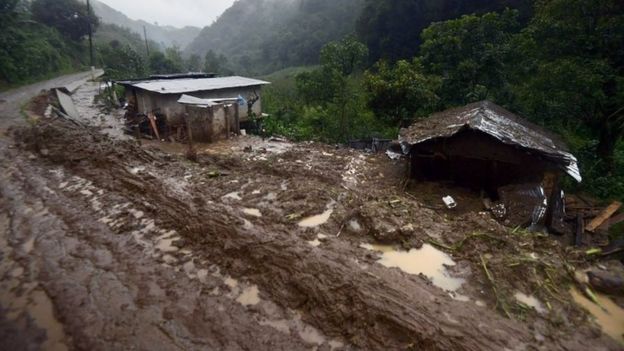
Some remote localities - like Coscomatepec in Veracruz - were virtually wiped out by powerful landslides
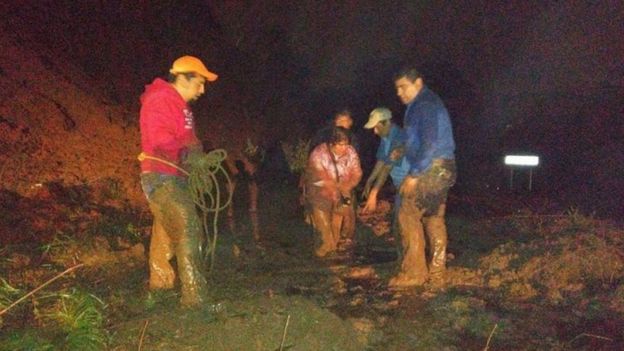
A rescue operation is under way in and around Huauchinango, Puebla
Most of the victims were in the remote town of Huauchinango, Puebla.
They died after their houses were engulfed by tonnes of mud and rocks.
A whole hill collapsed near Huauchinango, sweeping down on a nearby village, officials say.
"It is a tragedy what has happened to our people in Huauchinango," Mayor Gabriel Alvarado was quoted as saying by the Associated Press.
Heavy rain continued in the region, forcing officials to close a section of the main federal motorway to the capital Mexico City.
Earlier this week, at least nine people died on due to extreme weather in Haiti and the Dominican Republic as the storm passed over the Caribbean.
Source: bbc.com
- Read more
-
07/Aug/2016
Turkey coup: Erdogan backs return of death penalty at vast Istanbul rally
Turkish President Recep Tayyip Erdogan has told a vast rally in Istanbul that he would approve the return of the death penalty if it was backed by parliament and the public.
He was speaking to at least a crowd of at least a million who had gathered in Turkey's biggest city.
The rally followed last month's failed military coup.
Mr Erdogan also said the state would be cleansed of all supporters of the US-based cleric Fethullah Gulen.
The cleric is blamed by the Turkish government for the attempted uprising. He denies any involvement.
Religious figures and leaders of two of Turkey's three opposition parties attended the rally. The Kurdish party was not invited.
More than 270 people died in events surrounding the 15 July coup attempt, which triggered a government crackdown.
Thousands of alleged supporters of Mr Gulen have been detained or dismissed from government jobs.
Western nations have been critical of the government's response to the coup. The European Union - which Turkey has applied to join - refuses to accept capital punishment in member states.
'Five million'
The parade ground, built to hold more than a million people, was overflowing, with streets of surrounding neighbourhoods clogged by crowds, Reuters news agency reports.
Turkish government sources said five million people had attended, with the event broadcast live on public screens at smaller rallies across Turkey's provinces.
Mr Erdogan told the rally: "It is the Turkish parliament that will decide on the death penalty... I declare it in advance, I will approve the decision made by the parliament.
"They say there is no death penalty in the EU... Well, the US has it; Japan has it; China has it; most of the world has it. So they are allowed to have it. We used to have it until 1984. Sovereignty belongs to the people, so if the people make this decision I am sure the political parties will comply."
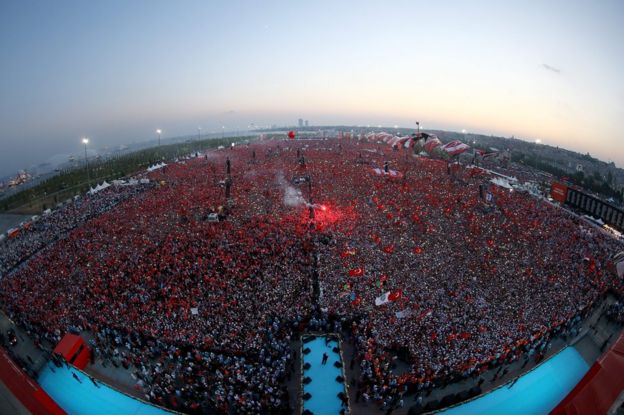
Government sources say five million people turned out
The president railed against Mr Gulen's movement, hinting of further hardline measures to come.
"July 15 showed our friends that this country isn't just strong against political, economic and diplomatic attacks, but against military sabotage as well. It showed that it will not fall, it will not be derailed," Mr Erdogan said.
"Of course we have to uncover all members of this organisation and eradicate them within the framework of the law, but if we content ourselves with just that, then we as a state and a nation will leave weak our defence against similar viruses."
The "Democracy and Martyrs' Rally" was the climax of three weeks of nightly demonstrations by Mr Erdogan's supporters around the country.
Speaking ahead of Mr Erdogan, Prime Minister Binali Yildirim told the rally that Mr Gulen would be brought to Turkey and made to pay the price for the coup attempt.
"Let all of you know, the leader of this terrorist group will come to Turkey and pay for what he did," Mr Yildirim said.
In a rare address to a public rally, the head of Turkey's armed forces, Hulusi Akar, said "traitors" would be punished in the harshest way, and thanked civilians for their role in defeating the uprising.
Former ally
The crackdown in Turkey has seen tens of thousands of public sector workers suspended or dismissed, with many having their passports cancelled. There has also been a massive reshuffle of the military.
About 18,000 people have been detained or arrested.
Local branches of the AK Party have been told to begin a purge of suspected Gulenists in their ranks.
Mr Gulen was a close ally of President Erdogan until a bitter split between his movement and the party of the president three years ago.
Turkey has listed Mr Gulen's movement as a terrorist organisation.
Source: bbc.com
- Read more
-
07/Aug/2016
Bikini-clad Swedish policewoman 'stops thief'
A bikini-clad Swedish police officer has been praised for tackling a suspected thief while she was off-duty sunbathing with friends in Stockholm.
Mikaela Kellner told the Aftonbladet daily that she and a fellow officer pursued the man when they realised he had taken one of their mobile phones.
She told the paper that she would have intervened "even if she were naked".
A photo of the incident on Ms Kellner's Instagram page has attracted more than 9,000 likes in less than two days.
The incident is said to have taken place in Stockholm's Ralambshov Park on Wednesday, where the off-duty policewoman was sunbathing with friends.
The group was approached by a man who claimed to be selling publications on behalf of the homeless.
Ms Kellner reportedly became suspicious when the man began lingering, setting some papers down over their blanket.
As soon as he left, collecting his papers, one of her friends noticed that her phone was missing.
"There was no time, so I ran after him, maybe 15 metres or so," Ms Kellner told Swedish news site, The Local.
"One of my friends is also a police officer, so we got hold of him. He tried to get away so we held onto him harder."
The stolen phone was swiftly recovered, and the man was arrested by a police patrol.
"I've had a lot of positive comments both from friends and colleagues," she told The Local.
"It happens all the time that valuables are taken like this... I mainly just wanted to raise awareness of how cunning these people are, almost like magicians."
Source: bbc.com
- Read more
-
04/Aug/2016
US Supreme Court blocks transgender toilet ruling
The US Supreme Court has temporarily overturned a ruling that allowed a transgender high school student to use the bathroom of his choice.
It is the first time that the fraught discussion over transgender bathroom rights has reached the country's highest court.
Judges voted 5-3 to halt a lower court's order that Gavin Grimm, 17, be allowed to use the boys' bathroom.
They will consider the case again in the autumn.
Mr Grimm who was born female, filed the lawsuit after his school board in Virginia adopted a policy that required students to use a private toilet or one that corresponds to the sex listed on their birth certificate.
An appeals court ruled earlier this year that the ban was discriminatory and violated Title IX, a federal law which prohibits gender discrimination at schools that receive federal funding.
The issue has gone back and forth between several different courts which have made opposing decisions.
As the Supreme Court is yet to rule definitively on the matter, it has set things back to the way they used to be, ahead of its eight justices beginning to hear the case in autumn 2016.
Mr Grimm appealed to the court not to discuss the matter, local media report, but its actions are exactly what the school board asked for.
A divisive issue
A number of places in the US - most recently North Carolina - have passed laws requiring transgender people to use a public toilet that corresponds to the sex listed on their birth certificate.
The North Carolina law in particular has been sharply criticised as discriminatory and several companies have stopped doing business in the state as a result.
Some people have said that allowing transgender people to choose their restroom could lead to women and children being attacked.
They said they feared that predatory men could pose as transgender people and use legal protections as a cover. Gender-neutral toilets are becoming more common in some parts of the US.
Source: bbc.com
- Read more
-
03/Aug/2016
One dead, several hurt in central London knife attack
A woman has died and five others were injured in a knife attack in Russell Square, central London.
Police and ambulance crews were called at 22:33 BST on Wednesday to reports of a man in possession of a knife and injuring people.
Up to six injured people were found at the scene; one woman was pronounced dead a short time later.
The man was arrested at 22:39; a taser was discharged by one of the arresting officers.
Terrorism is one possible motive being explored, the Metropolitan Police say.
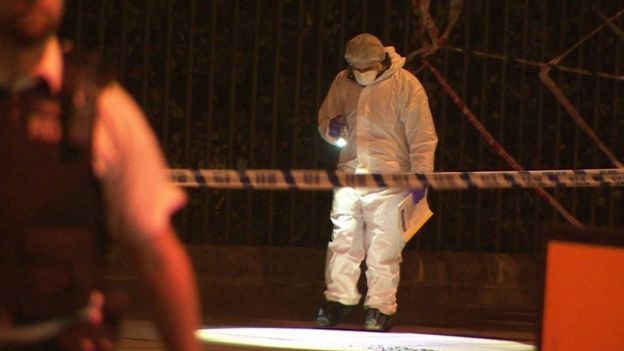
Forensics officers have been examining the area where the attack took place
Eyewitnesses have reported a police forensics tent has been erected on Southampton Row, outside the park in the centre of the square, which is close to the British Museum.
There is a heavy police presence in the area and the initial cordon around the crime scene has One dead, several hurt in knife attack been extended, according to BBC reporter Andy Moore, who is at the scene.
The condition of those injured and the extent of their injuries is not known at present.
Source: bbc.com
- Read more
-
03/Aug/2016
White House: Iran cash payment not ransom for hostages
The White House has dismissed claims that the US paid a ransom to Iran in exchange for the release of five American prisoners.
The five prisoners were released in January in exchange for seven Iranians who were detained in the US for violating sanctions.
The exchange came as the US lifted international sanctions against Iran as part of the country's nuclear deal.
The US also airlifted $400m (£300.3m) worth of cash to Iran at the same time.
The Wall Street Journal reported that US officials sent an unmarked cargo plane loaded with Euros, Swiss, Francs and other currencies, suggesting that the payment may have been related to the release of five Americans, which included Washington Post reporter Jason Rezaian.
But White House Press Secretary Josh Earnest denied the link, saying the payment settled a longstanding dispute between the two countries from before the 1979 Islamic Revolution.
Mr Earnest said Republicans who oppose the landmark Iran nuclear deal have used the payment as a means of undermining the accord.
"They're struggling to justify their opposition to our engagement with Iran," he said at a White House press briefing.
Normalising relations
After the world's six major powers announced they would lift sanctions against Iran as a part of the implementation of the historic landmark deal, Tehran and Washington also agreed to settle a number of disputes between the two countries.
- Iran nuclear deal: Key details
- Iran back in business for now
- What lifting Iran sanctions means for world markets
As Mr Earnest said in a press briefing on 19 January, the $400m (£300.3m) payment was "the result of a long-running claims process that had been at The Hague".
The then-Iranian government had purchased $400m (£300.3m) in US military equipment before it was overthrown in the 1979 Islamic Revolution.
The Obama administration had agreed to repay Tehran $1.7bn, which included the original payment as well as interest.
Cash payment on a cargo plane
Since Iran's financial institutions were completely cut off from the global electronic banking system at the time of the payment, it had to be made in cash.
The sanctions also meant it was illegal to make the payment in US dollars.
Republican presidential nominee Donald Trump took to Twitter to blame his Democratic opponent, former Secretary of State Hillary Clinton, for the payment.
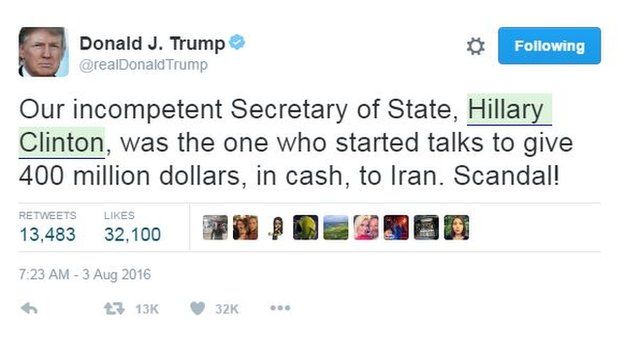
Though Mrs Clinton is credited with initiating talks for Iran's nuclear deal, the accord was reached under current Secretary of State John Kerry.
Republican National Committee spokesman Reince Priebus also released a statement on the report.
"The Obama-Clinton foreign policy not only means cutting a dangerous nuclear deal with the world's number one state sponsor of terrorism, it also means paying them a secret ransom with cargo planes full of cash," the statement read.
State Department spokesman John Kirby responded to the claims on Wednesday, vehemently denying any link.
"As we've made clear, the negotiations over the settlement of an outstanding claim at the Hague Tribunal were completely separate from the discussions about returning our American citizens home," he said.
"Not only were the two negotiations separate, they were conducted by different teams on each side, including, in the case of the Hague claims, by technical experts involved in these negotiations for many years," Mr Kirby said.
Source: bbc.com
- Read more
-
03/Aug/2016
Kabul explosion: 'Foreign compound' targeted by Taliban
A huge explosion has rocked the Afghan capital Kabul.
Witnesses said it was heard across most of the city about 01:25 local time on Monday (20:55 GMT Sunday).
Reports say it was caused by a lorry bomb at the North Gate compound housing foreign contractors and four attackers may be involved. The Taliban said it carried out the attack.
There is no word about casualties. Power in parts of Kabul was briefly cut off shortly after the explosion.
Gunfire was also heard at the scene of the blast, reports say, and police and security forces later sealed off the area.
North Gate is a heavily guarded compound, which was attacked by militants three years ago.
Earlier reports suggested that Monday's blast was in a gas storage facility.
Last week, two suicide bombers linked to the so-called Islamic State (IS) killed 80 people and wounded 230 more in Kabul.
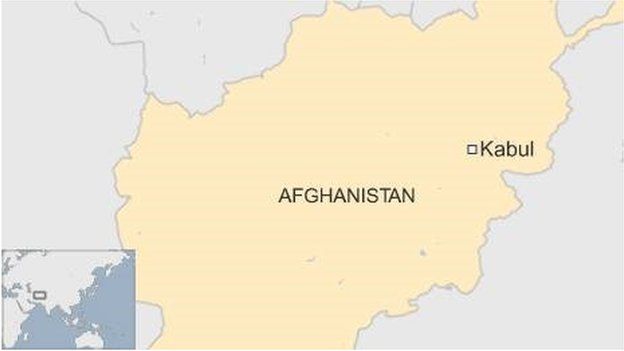
Source: bbc.com
- Read more
-
31/Jul/2016
France church attack: Two arrested over priest's killing
Two men have been placed under formal investigation over the murder of a priest in a Normandy church, including a cousin of one of the killers.
Farid K, 30, a cousin of attacker Abdel Malik Petitjean, was arrested on suspicion of "terrorist association".
The other man, Jean-Philippe Steven J, 20, was put under formal investigation for allegedly attempting to travel to Syria in June with Petitjean.
Petitjean and accomplice Adel Kermiche, both 19, were shot dead by police.
They had interrupted a church service in Saint-Etienne-du-Rouvray, near Rouen, last Tuesday, taken hostages and slit the throat of Father Jacques Hamel, 86.
What we know about church attack
Profile: Abdel Malik Petitjean
The Paris prosecutor's office said both men arrested on Sunday were being held in custody.
The development came as Muslims across France attended Catholic Mass in a gesture of solidarity after the murder.
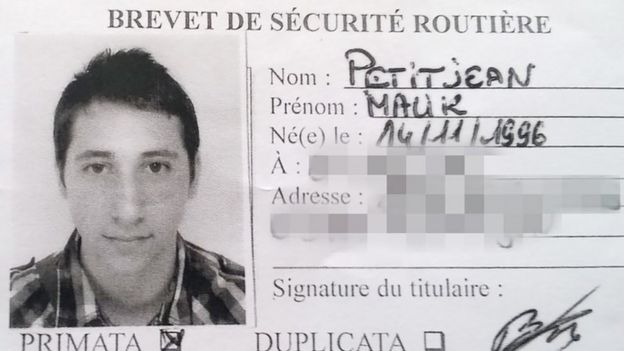
Abdel Malik Petitjean, pictured on his driver's licence, was on a watch list
France's Muslim council, the CFCM, urged Muslims to show "solidarity and compassion" over the killing.
Petitjean had been on a watch list as a potential security threat since June after trying to enter Syria from Turkey.
Adel Kermiche was also known to the security services.
So-called Islamic State (IS) released a video of what it said were the two men pledging allegiance to the group.
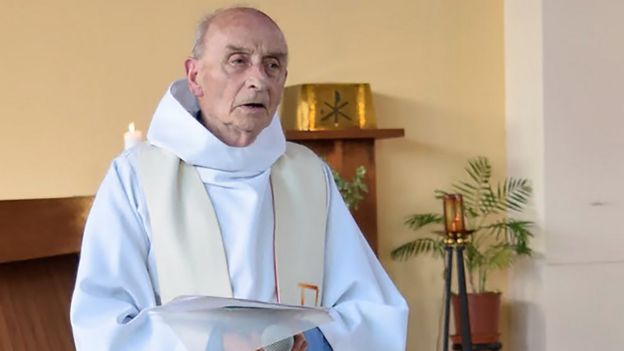
Father Jacques Hamel was a well-known figure in St-Etienne-du-Rouvray
Source: bbc.com
- Read more
-
31/Jul/2016
About Us
-
Archives
Recent posts
News for people who want to know
- Bakus Radio resource for |Ghana & Africa music |News |Entertainment |Sports | Copyright © 2016 . All Rights Reserved.
- Designed By Fresco Software Solution Pvt. Ltd.



























